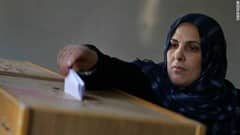It is comical to watch American TV anchors question reporters on the ground in Cairo concerning the sentiment of the Egyptian masses with regard to the army backed government that replaced Muslim Brotherhood rule. The anchors are sure that the masses must be hostile to the military’s rule and they question the reporters in the field with the obvious intention of eliciting reponses that will confirm the expected narrative.
They seem befuddled when the most they can tease out of reporters is an admission that there still exists a sizable minority in the population who back the Salafists including the Muslim Brotherhood in their desire to create a sharia law state in Egypt.
The truth is that most Egyptians want a continuation of the long tradition of a semi-westernized, mildly Islamic culture in Egypt. That culture extends back in history to the Muhammad Ali dynasty and the middle of the 19th Century. The khedival government in Egypt at that time was an extension of the Ottoman Empire. The Ottoman government of that time followed a path called the “tanzimaat” (reorganization). That path led in the direction of the West. It did not reach the West but it led in that direction. Egypt followed much the same path and a society developed in Egypt that was a hybrid of Western and Islamic values. In that system it was possible for reasonable lives to be had by the great majority in spite of the general poverty brought on by an ever growing population.
Governments came and went. Political systems changed over time. Khedival Egypt was replaced by a sultanate and then monarchy that tolerated some degree of parliamentary function. That government was followed by military rule for more than half a century. Naguib, was followed by Nasser, Sadat, and Mubarak. Mubarak’s resignation was accomplished by a wide coalition of largely urban political groups who seem to have assumed that elections would produce a civilian government satisfactory to the groups that had made the revolution a success. That was certainly the expectation in the United States in liberal political circles as well as among the ever hopeful neocons and the R2P posse.
What had been missed (largely because of wide spread belief in the “progress” of mankind) was the continuing existence of a large rural population who thought that the culture of the cities was corrupt and deeply sinful. The existence of this politically malleable mass inspired the Muslim Brotherhood and other salafist groups to enter the electoral process. Once in power, Mursi and company proceeded to modify the Egyptian state to fit their conception of God’s will reflected on earth.
Women, Christians, homosexuals, the westernized secular elites, ordinary Egyptians in the cities, all these groups came to understand that if the Mursi government was allowed to continue in its drive to Islamize all aspects of Egyptian life then Egypt would become yet another open air prison camp. Seeing the level of discontent the army acted.
The same Americans who have believed that nothing is more important than elections still believe that to be true. The lead editorial of the Washington Post today reflects the pathos of that attitude.
Most Egyptians do not accept that view of human affairs.
Reprinted with permission from author.

